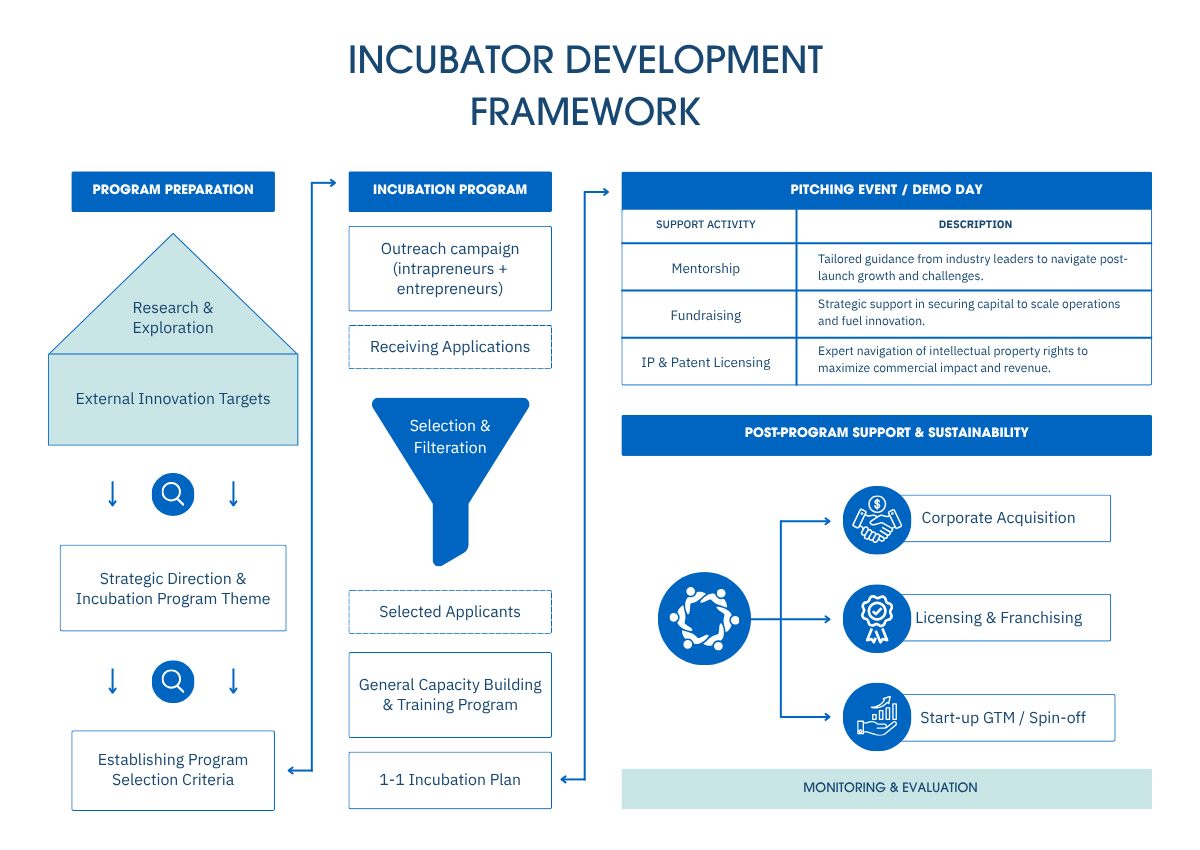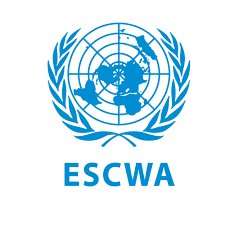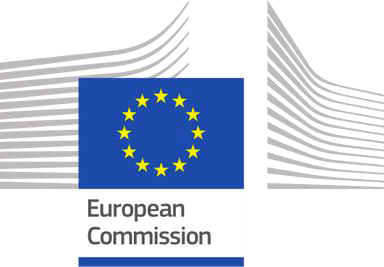A strong startup ecosystem needs high-performing incubators and accelerators to nurture ideas, guide founders, and connect them to markets and capital.
Without the right structures, many promising startups fail to scale — missing opportunities for job creation and economic growth.
We help universities, governments, and private sector actors design, launch, and optimize incubation and acceleration programs that consistently produce investment-ready businesses.
We create and strengthen innovation support programs by:


Implemented under Business Egypt, this program aimed to bridge the gap between corporations and startups by fostering collaboration, introducing disruptive solutions, and driving innovation in sectors such as manufacturing and logistics. It sought to equip startups with the tools, mentorship, and resources needed to scale while embedding entrepreneurial thinking within corporate structures for long-term transformation.
We designed a Corporate Incubator Playbook and recruited 10 high-potential startups through targeted outreach. Each received tailored training, mentorship, and incubation plans aligned with corporate priorities, followed by support for commercialization and market integration.

In collaboration with UNESCWA and Sudan’s National Information Center, this project aimed to establish technology incubators that would support high‑potential ICT startups, create jobs, and promote economic self‑sufficiency. The objective was to equip Sudanese startups with the tools and networks needed for survival and growth, driving technology commercialization and fostering a sustainable innovation ecosystem.
Performed a comprehensive entrepreneurial ecosystem analysis to assess gaps, stakeholders, and resources. Designed the incubator structure, including service offerings such as mentorship, IP management, financing access, and technical support. Developed a sustainable business model and operational framework while building partnerships with government, academia, private sector, and international organizations. Delivered capacity‑building programs for incubator staff and stakeholders.

The USAID TRADE Project aimed to boost Egypt’s exports by creating an Export Readiness Incubator and Accelerator for SMEs and New & Expanding Export Ready Enterprises (NEEREs). The goal was to provide tailored support, consulting, and networking to expand market access and strengthen trade institutions.
Designed a context-specific incubator and accelerator model through stakeholder consultations and global benchmarking. Defined strategy, services, and training modules, integrated B2B matchmaking, and developed a sustainable business model with an operational framework aligned to global best practices.

Many experienced lawyers aspire to establish their own practices but face challenges in accessing resources and gaining the business expertise needed to launch sustainable firms. This project aimed to assess the feasibility of creating a 1‑year legal incubator program to support early‑career lawyers in building their practices and meeting market demands for high‑quality, business‑oriented legal services.
Conducted a comprehensive feasibility study, combining organizational, financial, and economic assessments to define the viability and structure of the legal incubator. Using business opportunity generation methodologies, we designed a business plan and operational framework outlining services, revenue models, and long‑term sustainability strategies tailored to the Egyptian legal market.

Egyptian startups face barriers in talent, finance, IP knowledge, technology commercialization, and access to international markets. Recognizing this gap, THE NEXT SOCIETY sought to design a customized accelerator to support innovative, high‑growth Egyptian startups in scaling internationally and accelerating market entry.
Conducted policy mapping, gap analysis, and benchmarking of global best practices for startup internationalization. Developed two strategic accelerator models (early-stage and ecosystem hub) with detailed business concepts, operational models, funding mechanisms, and structures. Designed a long-term development plan outlining services, delivery channels, and business models for sustainable impact.

UNFPA aimed to create a Body of Knowledge (BOK) to equip participants in its social innovation incubator with tools for developing local solutions across its three pillars: family planning, maternal health, and ending gender-based violence & harmful practices. The BOK was designed to guide teams through all phases of the innovation process and build sustainable capabilities.
Created a comprehensive BOK covering opportunity mapping, business modeling, social M&E, finance, digital marketing, and pitching, with tools and templates. Over six months, we mentored UNFPA and partners to apply these across all incubation phases and ensured quality assurance for social innovator outputs.

UNFPA aimed to design a social innovation incubator leveraging design thinking to generate and implement local solutions addressing family planning, reproductive health, and gender‑based violence, including FGM. The program fostered collaboration with government, civil society, and youth‑led networks.
Designed a comprehensive incubator model, including a business and operational framework detailing processes, roles, and procedures. This was complemented by an implementation roadmap and partner mapping to ensure sustainability. Capacity‑building sessions were also conducted for UNFPA staff and stakeholders to embed innovation practices within program delivery.